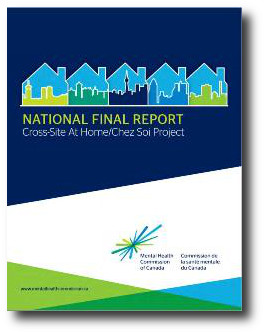 On April 8, 2014, the Mental Health Commission of Canada released a report documenting the final results of the At Home/Chez Soi research demonstration project, which examined “Housing First (HF)” as a means of ending homelessness for people living with mental illness in Canada. Housing First is an evidence-based and evaluated approach originating in New York City. In the HF model, housing is provided as the first step, in combination with supportive services, to people who are homeless and living with mental health issues.
On April 8, 2014, the Mental Health Commission of Canada released a report documenting the final results of the At Home/Chez Soi research demonstration project, which examined “Housing First (HF)” as a means of ending homelessness for people living with mental illness in Canada. Housing First is an evidence-based and evaluated approach originating in New York City. In the HF model, housing is provided as the first step, in combination with supportive services, to people who are homeless and living with mental health issues.
The HF approach provides immediate access to a variety of housing options, usually through rent subsidies in private sector housing units, and also provides appropriate mental health supports that are voluntary, individualized, culturally appropriate, and portable.
The report clearly shows the effectiveness of the ‘Housing First’ approach to ending homelessness among people with mental illness.
The MHCC’s At Home/Chez Soi project followed more than 2,000 participants for two years, and was the world’s largest trial of the HF approach, with demonstration sites in Vancouver, Winnipeg, Toronto, Montréal, and Moncton.
The report clearly shows the effectiveness of the ‘Housing First’ approach to ending homelessness among people with mental illness.
Here are the top three “Key Findings” and the top three “Policy Implications” of the research report:
Key Findings
- Housing First can be effectively implemented in Canadian cities of different size and different ethno/racial and cultural composition. Across all the five cities, HF programs were operated in a manner that was consistent with the HF model standards but were tailored to best fit the local contexts. The HF approach was successfully adapted to serve Aboriginal, immigrant, and other ethno/racial groups in a culturally-sensitive manner.
- Housing First rapidly ends homelessness. Across all cities, HF participants in At Home/Chez Sol rapidly obtained housing and retained their housing at a much higher rate than the treatment-as-usual group.
- Housing First is a sound investment as the economic analysis found some cost savings and cost offsets.
Policy Implications
- Housing First is an effective, pragmatic, and humane intervention to address homelessness. There are few interventions or strategies designed to address homelessness that can truly be described as best practices; Housing First has proven to be one of them.
- Housing First improves access to community services and can contribute to cost containment. The findings indicate that there are measurable cost offsets associated with HF in the area of health care.
- To achieve the best outcomes, HF programs should demonstrate high fidelity to the core aspects of the HF model. The research found that housing stability, quality of life and community functioning outcomes were all more positive for programs that operated most closely to HF standards. In addition, though hardly surprising, research confirmed again that for such a model as the HF approach to function effectively, collaboration across government, communities, and service sectors is essential.